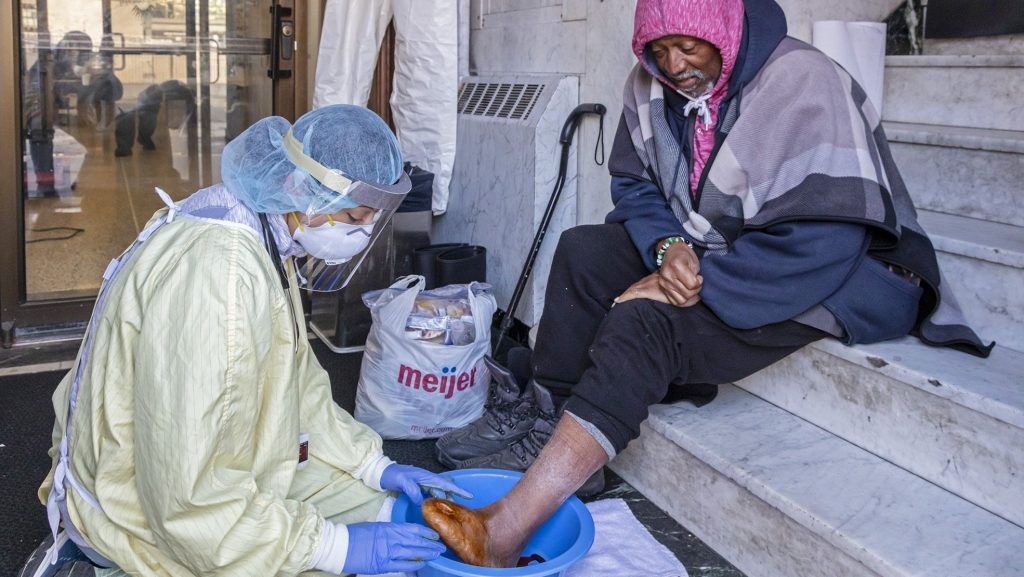Coronavirus restrictions have forced the Vatican to scale down this Sunday’s commemoration of the World Day of the Poor, a Vatican archbishop said Thursday.
Speaking at a press conference Nov. 12, Archbishop Rino Fisichella said that the pope would not be able to host a lunch for poor inhabitants of Rome at the Vatican as he had in previous years.
The president of the Pontifical Council for the Promotion of the New Evangelization also noted that the Vatican would be unable to provide a “field hospital” for the poor in St. Peter’s Square as it had in the past.
He said: “As one can imagine, the customary events that have been realized in recent years -- I refer in particular to the field hospital in St. Peter’s Square and the lunch with 1,500 poor people together with the Holy Father in the Paul VI Hall -- have been suspended in order to comply with current regulations.”
But Pope Francis will follow his custom of celebrating a Mass in St. Peter’s Basilica on Nov. 15, when the annual observance of the World Day of the Poor falls.
“Besides volunteers and benefactors, only 100 persons will be present in St. Peter’s Basilica, to represent symbolically all the poor people of the world who, on this day, particularly need the attention and solidarity of the Christian community. Some persons, who are assisted every day by different charitable associations, will proclaim the readings,” Fisichella said.
The Vatican archbishop said that measures to restrict the pandemic would not prevent other charitable activities at the Vatican and throughout Rome.
“In the clinic under the colonnade of St. Peter’s, by the Elemosineria Apostolica (the Office of Papal Charities), the poor who must have access to dormitories or those who want to return to their homeland can get the coronavirus cotton swab test,” he said. “The clinic is open from 8 a.m. to 2 p.m. and, in two weeks, has carried out 50 cotton swabs tests per day.”
With support from Elite Supermarkets and the soccer team AS Roma’s charity Roma Cares, the Vatican has sent 5,000 food packages to families in around 60 parishes in Rome.
Fisichella said that each box contained products “from particularly prestigious brands,” including pasta, rice, tomato sauce, coffee, cookies, and chocolate, as well as face masks and a card featuring a prayer by Pope Francis. The boxes were packed and distributed by 20 young people currently seeking employment.
The archbishop also disclosed that the Italian food company La Molisana had contributed “2.5 tons of their renowned pasta” to the Vatican’s initiatives.
Fisichella added that, with the help of the Italian financial services firm UnipolSai, the Vatican had sent the first consignment of 350,000 masks to students, in order to spare poorer families “at least, of the expense of these masks.”
“This effort also hopes to be an invitation to our young students not to underestimate the risks of the pandemic, especially with behaviors that could be harmful once they return from school to their families with the presence of elderly people,” the archbishop explained.
Fisichella said that Catholics around the world could take part in this Sunday’s World Day of the Poor using a pastoral aid available in five languages, including English, on the website of his pontifical council. The text includes the pope’s annual message marking the day, lectio divina, and a rosary prayer for the poor.
The theme of this year’s World Day of the Poor comes from a line in chapter six of the Book of Sirach: “Stretch forth your hand to the poor.”
Pope Francis released his message marking the day in June. In it, he said that the coronavirus pandemic had revealed new depths of poverty that Catholics could not ignore.
“This pandemic arrived suddenly and caught us unprepared, sparking a powerful sense of bewilderment and helplessness. This has made us all the more aware of the presence of the poor in our midst and their need for help,” the pope wrote.
Pope Francis established the World Day of the Poor at the end of the Jubilee Year of Mercy in 2016. It is celebrated each year on the 33rd Sunday of Ordinary Time, a week before the Feast of Christ the King.
In his message for this Sunday’s commemoration, the pope wrote: “In order to perform an act of worship acceptable to the Lord, we have to recognize that each person, even the poorest and most contemptible, is made in the image of God. From this awareness comes the gift of God’s blessing, drawn by the generosity we show to the poor.”
“Time devoted to prayer can never become an alibi for neglecting our neighbor in need. In fact the very opposite is true: the Lord’s blessing descends upon us and prayer attains its goal when accompanied by service to the poor.”

